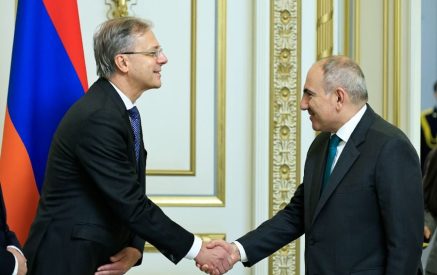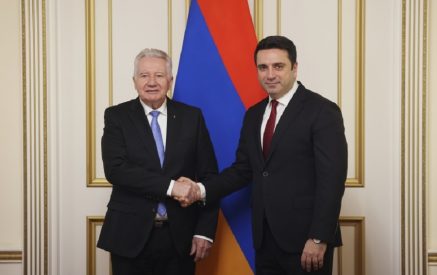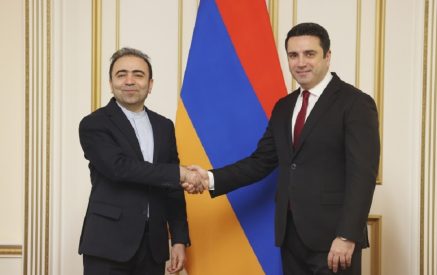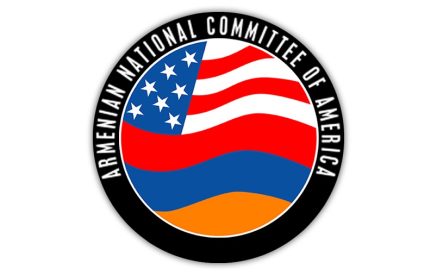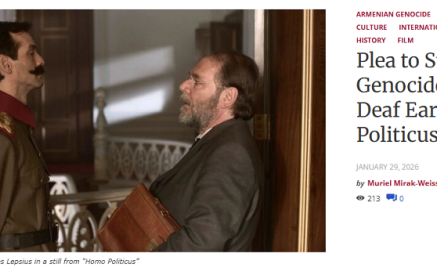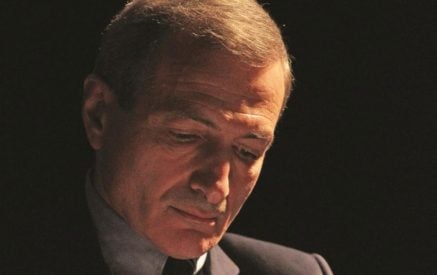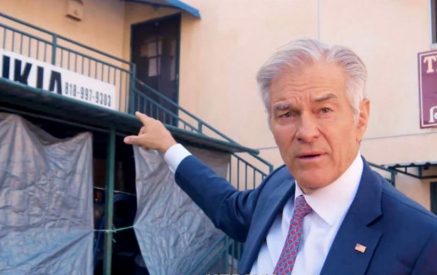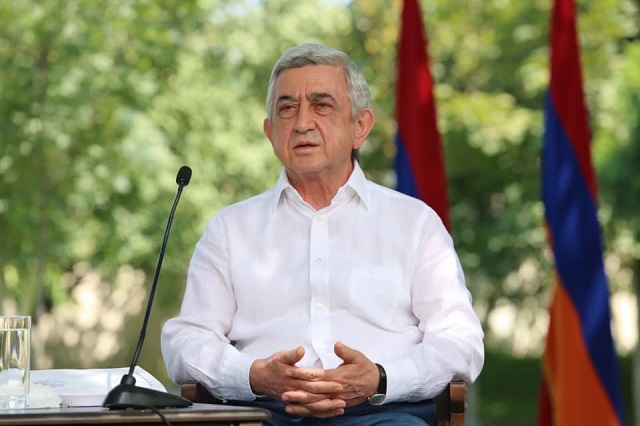Introductory remarks by Third President of the Republic of Armenia Serzh Sargsyan at the meeting of the National Assembly Investigative Commission, which investigates the circumstances of the 2016 April hostilities
19/08/2020
16.04.2020
Good afternoon,
Before answering the questions of interest to you, I would like to address the panel with a brief introductory speech. Also, I suggest attaching it to today’s meeting’s minutes.
First of all, I will explain why I decided to accept your invitation, come and answer any question that might be asked in here, although many of my supporters, members of the political team urged me to avail myself of my right to reject the invitation on the grounds that the Commission seemed to have been set up for political considerations, and its members had repeatedly expressed biased and incorrect opinions about the April events.
But I decided to come over, even if their concerns were relevant, since I wanted to look straight in your eyes trying to understand whether there is anyone to question the victory of the Armenian side in the Four-Day April War. Is there anyone who can professionally substantiate that Azerbaijan is on the winning side while it has lost most of its elite units? Can anyone tell me that the Armenian side which stopped a large-scale offensive with numerous examples of unspeakable courage suffered a defeat? Can anyone provide evidence of a war ever waged in the history of mankind where only soldiers fought and won without commanders?
The question may arise as to why I have so far failed to speak out about the April War and downplay the speculations on this topic. To be honest, at first there was no need for it, and then there was no expediency. That is why I proposed to hold a commission hearing with my participation at the end of the state of emergency, so that after the hearings I could have the opportunity to address the issue in the presence of media outlets and disclose all relevant information.
Let me now address some issues that have unfortunately become the subject of speculation.
Before arguing about whether we won or lost by repelling the April aggression unleashed by Azerbaijan, one ought to have a clear idea of what victory is, and what defeat is in a war.
It is obvious that wars are not an end in themselves, they always pursue political goals. War is the “continuation of politics” in other ways. It is a victory for the defending side when it succeeds in aborting the aggressor’s plans with minimal losses. No warfare can be deemed successful for the attacking side if it does not achieve at least part of its political goals.
Before answering the question of whether we won or lost the April War, let me briefly touch on whether we could prevent or avoid the war. Now I can confidently state that it was impossible.
Why? Because Azerbaijan was not ready to accept any compromise acceptable to us: I am convinced that they are not prepared to acknowledge the right of the citizens of Nagorno-Karabakh to determine the status of their country by free will. Thus, there was only one way to avoid war: unilateral concessions, which, of course, was not even discussed as it was unacceptable for us.
As I said, victory comes when one’s political goals are materialized through war. What political goals were pursued by Azerbaijan? Those goals have been formulated in the findings of both domestic and foreign expert studies, in the comprehensive analyses carried out by competent authorities, as well as in the decisions and statements made by the leaders of foreign states, including the OSCE Minsk Group Co-Chairs.
They pursued an ultimate goal of achieving a U-turn in the negotiations. They wanted to prove that the conflict might have a military solution as the negotiations were not in their favor. Ilham Aliyev demonstrated it best in 2016 during the October, 2007 cabinet meeting of the Government of Azerbaijan, when he acknowledged that behind closed doors the international community had been urging him to recognize Nagorno-Karabakh’s independence.
Second, Azerbaijan was striving to give to oblivion the fact that Artsakh was a party to the conflict as vividly evidenced by the tripartite ceasefire arrangement signed as early as in 1994.
Third, it was extremely important for Azerbaijan to root out the loser’s complex in the minds of its own people and in the army by representing themselves as winners. Instead, they were trying to get the winner’s psychology of our troops changed into the psychology of a loser. I can cite other goals as well, but let us stop on what was said.
Now let us see whether they achieved their goals or not?
First, the failures on the battlefield did not allow Azerbaijan to confront the Armenian side and the international community with “fait accompli” and force us to negotiate their own agenda. In the meantime, there was a breakthrough in the negotiations concerning the agenda that we had been insisting on ever since 2013 with a view to setting up an international mechanism for investigating ceasefire violations.
After the April War, Aliyev had to agree with this reality in Vienna and then in St. Petersburg. By the way, this was a key component in the legacy left by the former Armenian authorities. I will explain it in more detail, if necessary.
Thus, as a result of the April aggression, Azerbaijan suffered huge losses not only in military terms, but also in the diplomatic arena. It came to prove that Azerbaijan was unable to solve the problem through the use of force.
Second, having failed on the battlefield, Azerbaijan was forced to be back to the table of negotiations together with Russia. We were expected to agree to Azerbaijan’s proposal for signing a new ceasefire agreement. But we refused, insisting that the 1994 agreement was still standing as it was signed for an indefinite term. That is, we refused to sign a new ceasefire document, which in fact would push Artsakh out of the peace process as an equal party to the conflict. Later on, we received a clear-cut position on the part of the Co-Chairs, with the official statement spread in the OSCE, which reaffirmed the deadline-free nature of the tripartite ceasefire agreement of 1994.
Third, as I said, Aliyev wanted to raise the fighting spirit of his own people and army through war in order to create some myth of “victory.” They had even mobilized special groups to quickly publicize the expected success. But it did not work out thanks to our soldiers’ bravery.
Going a little further, I should say that I deeply regret to see that some forces have been serving this very goal inside our country over the past few years.
For four years now, myths and absolute lies have been fomented about our soldiers’ being left without food and fighting with shovels. To make things worse, some used to claim that our armored vehicles were filled with water instead of diesel fuel. This is just a shame, even from the point of view of achieving political goals.
After all, was the April War a victory or a defeat for the Armenian side? I have never questioned it, since I am convinced that this is our victory, the victory of all of us.
Did our military-political leadership work effectively? Despite some minor shortcomings, almost all military, political, state and civilian parties did their best during the hostilities. As for the shortfalls and lessons, there is the Top Secret Report drafted by the Armenian Ministry of Defense and the General Staff of the Armed Forces that I suppose is available for commission members’ reference.
Was it possible to reject the armistice and try to restore our initial positions? I think so. But it was very likely that we would have dozens of new victims, new mourning parents, new orphans, and new widows.
Could we reject the ceasefire in order to punish Azerbaijan by expanding the security zone with new territories? Without ruling out the possibility of success, I would say that it would be an adventure fraught with unpredictable consequences, up to the outbreak of a full-scale war, as a consequence of thousands, maybe tens of thousands of victims, destroyed towns and villages.
In view of the above and taking note of the opinions of the Minister of Defense, the Chief of General Staff of the Armed Forces, the President of Artsakh and the Commanders of the Defense Army, and in my capacity of Commander-in-Chief, I decided to accept the proposal of ceasefire.
This perhaps a little long introductory speech was meant to foster a substantive discussion of issues arising from the Commission’s goals and mandate. I am prepared to answer your questions for the good of our state and people.
You yourself understand that the Four-Day War is a small part of the millennial history of the Armenian people who are fighting for their dignity, freedom and survival. Please remember that regretfully the war is not yet over.
Thank you.


























